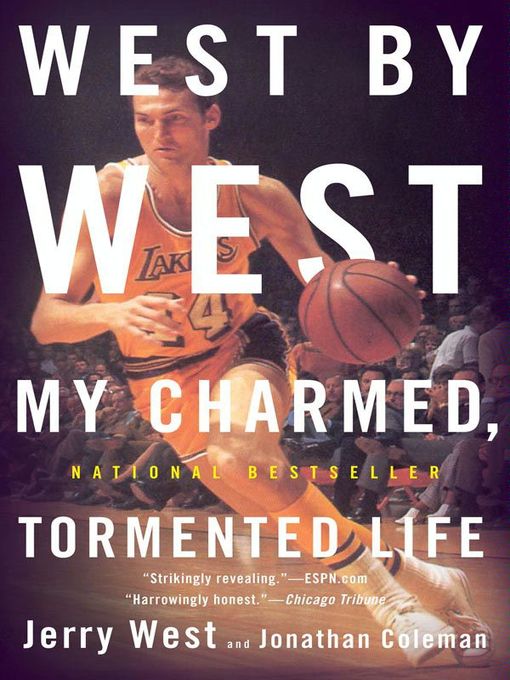
West by West
My Charmed, Tormented Life
- اطلاعات
- نقد و بررسی
- دیدگاه کاربران
نقد و بررسی

August 29, 2011
A pressure-embracing superstar with the Los Angeles Lakers in the 1960s and 1970s, West (called “Mr. Clutch”) was so revered that the NBA used his silhouette for its famed logo. After a legendary Hall of Fame playing career, West became the Lakers’ general manager, helping to assemble squads that won eight world championships in the 1980s and 2000s. Such lofty accomplishments did little to abate a self-destructive competitive spirit and crippling bouts of depression, the results of a miserable childhood in West Virginia. West’s beloved older brother, David, was killed in the Korean War; their father regularly beat the skinny, younger, West, inspiring a murderous, unforgiving hatred. “And the real enemy is myself, “ writes West, in this candid and self-reflecting autobiography. That willingness to share, however, extends little beyond his tortured soul, as he holds back in detailing his occasionally tense relationships with coaches like Phil Jackson and Pat Riley and storied players such as Kobe Bryant (who declined to be interviewed for the book). West’s reluctance to detail his dealings with others coupled with the authors’ anecdotal style lead to a lack of perspective and narrative heft that doesn’t befit the rich, complex life of such an iconic sports figure. 16 pages color photos, 14 b&w photos.

September 15, 2011
From the player so iconic his silhouette forms the NBA logo, a memoir intended to explain himself to fans and to...himself.
Jerry West is on everyone's list of the greatest basketball players ever. As the general manager of the Lakers, he assembled six championship teams. He's so beloved and admired, there's a statue of him outside Los Angeles's Staples Center. Who wouldn't want to be Jerry West? Well, maybe Jerry West, for one. He played basketball, he writes, "to try and feel good about myself when everything else in my life was confusing and frustratingly unexplainable." An abusive father, an emotionally remote mother and the Korean War death of a favorite older brother accounted for this withdrawn, overly sensitive youth who turned to basketball to feel alive and in control. The game became a sanctuary, but did nothing to repair a tormented soul and perhaps even exacerbated some "weird" tendencies that have complicated his life. Notwithstanding all his on-court success, his reputation as "Mr. Clutch," this tortured perfectionist remains "scarred" by his failures: a one-point loss in the 1959 NCAA championship game, six NBA Finals losses to the '60s Celtics, not winning the MVP award for his outstanding 1969-70 season. Hardcore fans will relish West's reflections on the game that has obsessed him, stories about teammates and opposing players and his selections for an all-time Dream Game. They'll likely be surprised by his erudition—he peppers the narrative with allusions to writers as disparate as Malamud, Merton, Didion, Gladwell and Joseph Campbell—and the numerous, unflattering personal revelations. West makes scalding comments about people as diverse as Douglas MacArthur, Jesse Jackson and Phil Jackson, but he reserves his harshest commentary for himself as a brother, father and husband. He grapples with the role of a sports hero, a mantle he's loath to embrace, and appears to have made a sincere, if not always successful, attempt at self-awareness.
In a genre notorious for merely waving pompoms, West offers an unusually candid account of his personal and professional life.
(COPYRIGHT (2011) KIRKUS REVIEWS/NIELSEN BUSINESS MEDIA, INC. ALL RIGHTS RESERVED.)

September 15, 2011
Most basketball fans know West, All-American, NBA Hall-of-Famer, the basis for the silhouette on the NBA logo, and, later, coach and team executive, a Lakers veteran. He coauthored an autobiography, Mr. Clutch, in 1970, but now new generations of readers will get to know him much better. Certainly, here are the requisite accounts of games, players, and coaches (including insights and opinions about Kobe Bryant, Shaq, and Phil Jackson), but West, who ironically makes a point about having never visited a mental-health counselor, spends much of his time "on the couch" baring a soul that was tortured by an abusive father and the death of an older brother in the Korean War. Likewise, he writes of those seven NBA championship series defeats of the Lakers by the Boston Celtics (six with West as a player, one with him as general manager). Such losses, personal and professional, were dangerous stuff for someone with a family history of depression. VERDICT Despite West's bleak moods and obsessions it is clear that he has achieved at the highest level both on and off the court, and, from that, readers may draw inspiration. This will appeal to the basketball fan who wants a look at the man behind the statistics.--Jim Burns, Jacksonville P.L., FL
Copyright 2011 Library Journal, LLC Used with permission.

September 15, 2011
West possesses one of the most enviable carrers in basketballa 1960 Olympic Gold Medal, all-star selection every year of his 14-year pro career, a championship in 1972 with his beloved Los Angeles Lakers, a ranking of fifth all time in points per game (27), Hall of Fame induction in 1980, and, later, as Lakers general manager, leadership of the dynasties of the 1980s and the early 2000s (three-peat, anyone?). His silhouette has even served as the NBA's official logo since 1969. Still, as this memoir makes too clear, West's success has been forged out of tragic pain, from an impoverished, abusive childhood in rural West Virginia to the loss of a sibling early in life to devastating defeats in NCAA and NBA title games to political losses within the Lakers hierarchy that resulted in his departure from the team in 2002. If West's star is among the brightest in the NBA firmament, the dark side of his success, told with startling candor, is almost too painful to learn. But fans of the game will want to understand what made Jerry West run.(Reprinted with permission of Booklist, copyright 2011, American Library Association.)




دیدگاه کاربران